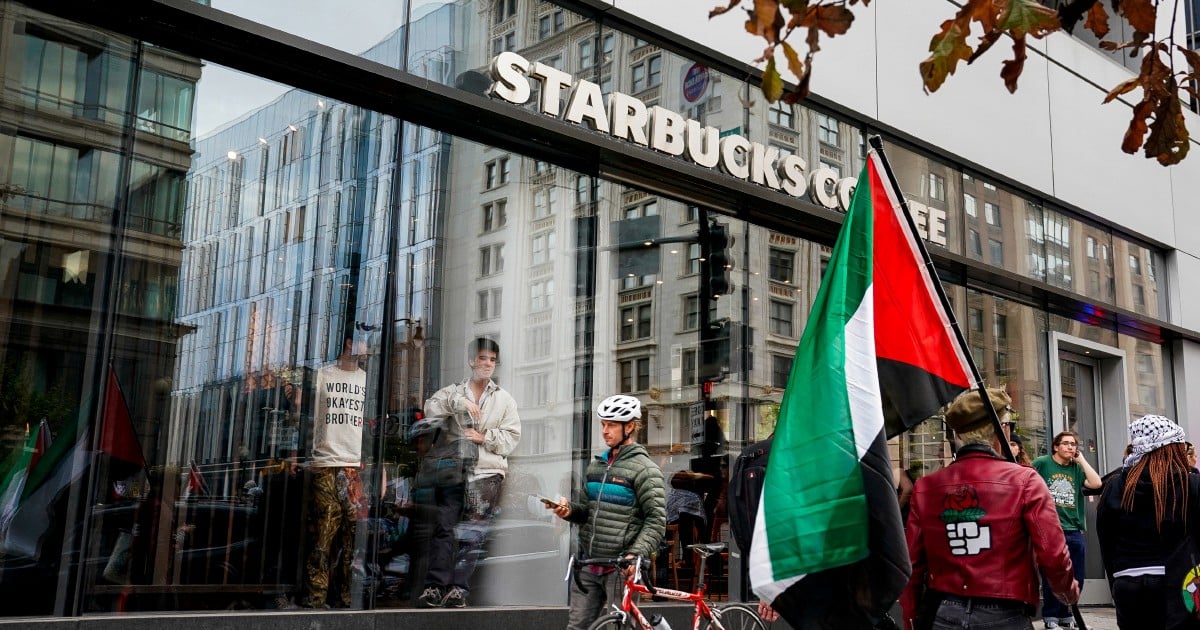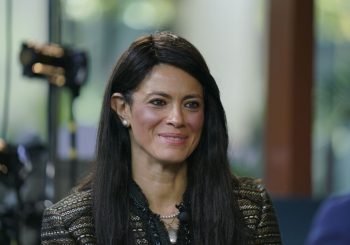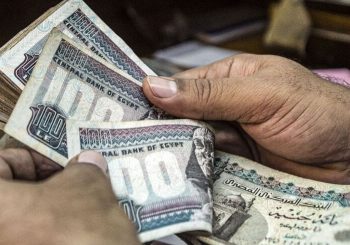Years ago, the Green Dot, a simple green circle framed by two arrows, emerged as the first ever visible symbol of a company’s ethical and environmental transparency.
The symbol embodied a profound shift in consumer-company relations. Before the Green Dot, the relationship was one-sided—companies produced, consumers consumed, and waste accumulated. Then, in the 1990s, the Green Dot mandated companies to recycle their packaging, engaging them in the product’s lifecycle.
Similarly, post the Gaza war, Starbucks Egypt adopted a new symbol of transparency – the QR code. This seemingly simple square, nestled on menus, enables customers to engage with the company’s values with a smartphone scan. Egyptian Starbucks customers can now, with a quick scan of their smartphones, understand more clearly the ethical and political values of the company.
“This QR code gives customers the answers they deserve. Multiple people and customers have told me that it is religiously forbidden to work here, but when I converse with them, they become convinced with my decision to continue working,” shared a Starbucks employee.
However, the journey towards increased transparency is not without bumps. Concerns about greenwashing, or the exploitation of current social and political movements (woke-washing), without genuine commitment, has been debated.
While boycotts can be effective tools, they are not the only solution. Advocating for stronger labor regulations, and responsible sourcing practices are vital for a just and transparent business landscape.
The push for transparency: Global brands navigate conscious consumerism
Global brands often encounter scrutiny over ethical practices. The garment industry, particularly fast fashion, has been a hotbed of controversy for years, with concerns about worker exploitation, unsafe working conditions, and environmental damage.
Consumers are becoming more mindful and conscious of the human cost of their consumption and are demanding greater transparency from the brands they buy from. In today’s hyper-aware society, consumers yearn for genuine transparency about the ethical practices of the brands they support.
The challenge for businesses lies in lifting the veil on their entire value chain, not just the final product sitting on the shelf. This journey towards radical transparency demands a meticulous approach to data and business or political affiliations, encompassing every step from raw material sourcing to product disposal.
Edelman’s Earned Brand Study in 2018 revealed that over half of all consumers, a staggering 57 percent, are willing to actively support or boycott a brand based on its stance on social issues. This “belief-driven buyer” segment expects brands to take a stand on issues they hold dear and won’t hesitate to walk away from silent bystanders.
The Palestinian conflict has long been a flashpoint for global activism, and boycotts have emerged as a tool for voicing solidarity with the Palestinian people. This history is particularly intertwined with two multinational giants – Starbucks and McDonald’s – who have repeatedly faced calls to take a stance on the issue.
The landscape of boycotts has shifted dramatically, evolving from a targeted focus on Israeli goods in 1948 by the Arab League to a multifaceted movement driven by political consumerism, as well as cultural and ideological clashes.
Some Egyptians are questioning the cultural assumptions embedded in certain global brands and their alignment with Egyptian identity. Videos circulating online criticizing American values and boycotting investment companies like Vanguard, a major player in the American financial system and owns most fast food companies, exemplify this cultural critique.
Youssef El-Nagati, 28, explains that he first heard about the boycotts through social media. For him, the boycotts symbolize fighting back against Western cultural and economic supremacy, and that he will not stop boycotting even if the war on Gaza ends.
“The boycott movement helped me realize that we should have boycotted since the very beginning. For too long, we have given them [the Western nations] the economic power to purchase weapons that are now used against our brothers and sisters,” he says.
“The only way we can support Palestinians is if we are also empowered economically, and social media helped me realize that this is not just a movement by Egyptians, but it is also a global movement.”
Yasmin Hesham, 28, an economist and researcher, argues that changing consumer behavior reflects a potential shift towards “humanistic economics.” In this model, consumers base their purchasing decisions not just on price and quality, but also on broader societal impact and alignment with their personal values.
This trend, potentially leading to a new form of “ethical consumerism,” could require companies to adjust their strategies to address evolving consumer priorities.
Currently, Hesham’s grocery trips are now less about grabbing the usual products and more about a meticulous exploration of the stories behind the products she picks up. Using her mobile phone, Hesham delves into the background of the CEOs and executives behind the brands she considers. She digs into their public statements and company policies to understand their alignment with her own values.
The push for corporate transparency led Starbucks to address Gaza War-related boycotts. In 2014, during the Gaza War, Starbucks released a statement in reaction to a boycott.
The chain stated on its website that neither the company nor its Jewish CEO, Howard Schultz, ever sent money to Israel or the Israeli Defence Forces. Additionally, the statement added that Starbucks closed its locations in Israel in 2003.
Both Starbucks and McDonald’s have faced immense pressure once again this year, particularly following a lawsuit by Starbucks against its union for expressing solidarity with Palestine. Starbucks distanced itself from the union’s statement and reiterated its neutrality.
McDonald’s also faced criticism for an Israeli franchise offering free meals to soldiers, yet the company reiterated its neutrality, as McDonald’s Saudi Arabia contributed USD 533,000 (EGP 16,470,339.60) to aid efforts in Gaza.
These companies have consistently adhered to a strategy of maintaining neutrality, citing their role as apolitical businesses focused on providing products and services to a diverse clientele.
Yet, in today’s conscious consumer landscape, brands are no longer just about product features and prices. They have become potent symbols of values and commitments, as Jonathan Copulsky, former CMO of Deloitte Consulting and author of Brand Resilience, puts it: “Choosing a brand today is as much about choosing an identity as it is about choosing a product.”
For instance, since the war on Gaza, a new wave of Egyptian consumers is brewing a new trend of brand loyalty fueled by national pride and a desire to support their own. Some of these shoppers are abandoning the familiar logos of global giants and opting for locally-made alternatives, championing brands that reflect their own unique Egyptian identity.
However, blindly embracing local brands without considering their ethical practices can be a dangerous oversight.
Local does not automatically equate to ethical. Egyptian businesses, like their global counterparts, are not immune to labor exploitation, environmental negligence, and questionable sourcing practices. It risks overshadowing their shortcomings and delaying the necessary push for ethical reform.
Egypt is one of the six nations included in a recent International Labour Organization (ILO) initiative to expedite the abolition of child labour in African supply chains. From the exploitation of child labor in cotton fields to the harsh working conditions in garment factories, unethical labor practices have long been a stain on Egypt’s supply chain.
While boycotting brands over political affiliations can send a powerful message, it risks overlooking equally egregious practices within other companies’ supply chains.
Navigating Foreign Investment and Worker Rights
In developed economies, conscious consumers might have the luxury of focusing on specific issues like fair trade or environmental sustainability. But in emerging economies, where limited resources are often the norm, the stakes are higher.
Developing countries often see foreign investment as a crucial engine for economic growth and job creation. However, these investments frequently prioritize maximizing profits over worker rights. Workers unions, vital for safeguarding worker interests, often lack effective bargaining and organizing power.
While boycotts might aim to pressure corporations to take a political stance, the immediate impact can be borne by the already-struggling workforce. Amidst a boycott and declining sales, Starbucks Egypt reportedly laid off workers. The move raises concerns about the impact on employees and highlights the complexities of consumer activism in a volatile political context.
One Starbucks employee in Egypt, who spoke on the condition of anonymity, said that he and his colleagues have faced several incidents of harassment by consumers in the early phases of the war.
“There were some customers that would come and take pictures of us and then walk away. Others would come to distribute pictures of Gaza to us and force people inside the store to walk away or not buy from us,” he says.
“The company has opted not to renew contracts for some workers, and the timing coincides with the end of the annual renewal period,” he adds.
In response to the boycotts, the Federation of Egyptian Chambers of Commerce released a statement, reiterating that the branches in Egypt are owned by Egyptian investors, which employ tens of thousands of Egyptians, and pay taxes and insurance to the state treasury. The statement also added that the boycotts harm the salaries of tens of thousands of Egyptians who are employed by these companies.
Alternatively, focusing boycotts on specific policies or practices within companies, rather than entire operations, can minimize the impact on workers. Engaging with unions and worker advocacy groups can help ensure their voices are heard and their needs are considered.
The fast fashion industry, notorious for its unethical practices, has increasingly faced scrutiny from boycott movements like Fashion Revolution and Remake. These movements partner with garment workers to amplify their voices and push for fair labor rights, achieving notable successes through innovative strategies.
Both movements actively partner with worker coalitions and unions, ensuring that worker voices are at the forefront of advocacy efforts. This collaborative approach empowers workers to lead the fight for their rights.
Boycotts and public pressure have led to several fast fashion giants signing onto agreements like the Bangladesh Accord, committing to improved safety standards and worker rights. These successes demonstrate the collective power of consumers and workers working together.
These movements demonstrate that consumer power, when aligned with the voices of workers, can be a potent force for positive change.






Comment (1)
[…] Read More […]